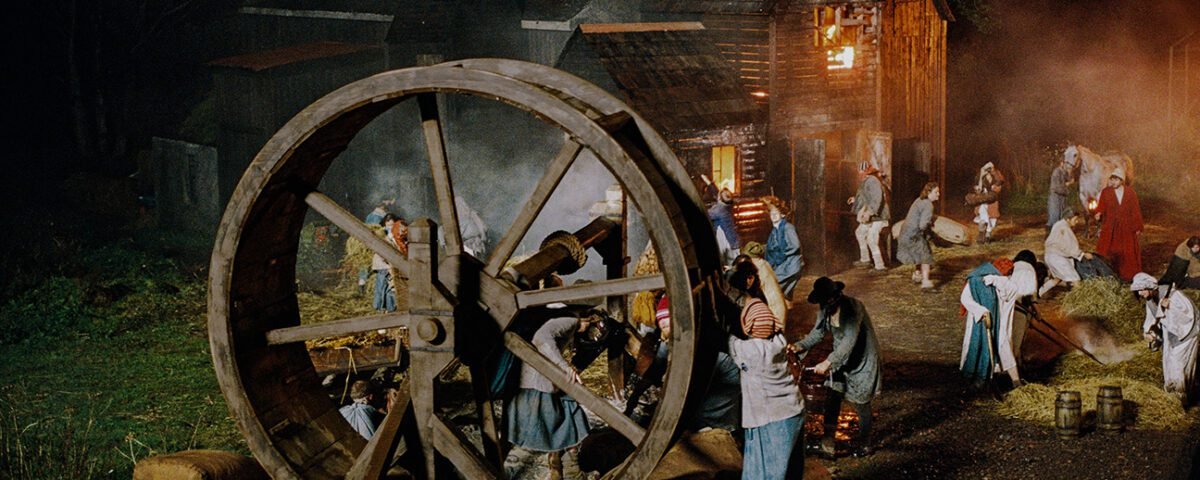


‘Better Man’ Review: ‘Greatest Showman’ Director Tackles Robbie Williams Biopic, With a Simian Twist and Mixed Results
September 6, 2024


‘Familiar Touch’ Review: A Tender Debut Frames Older Adulthood as Its Own Coming-of-Age
September 7, 2024The latest feature by Greek Weird Wave filmmaker Athina Rachel Tsangari is an adaptation of Jim Crace’s acclaimed novel.
Harvest
Farm fresh.
Greek writer-director-producer Athina Rachel Tsangari’s last feature was 2015’s Chevalier, a sly black comedy skewering masculine hyper-competitiveness which built on the promise of her first two acclaimed works, Attenberg (2010) and The Slow Business of Going (2000). Those put her on the cutting edge of the Greek Weird Wave along with her compatriot Yorgos Lanthimos (Poor Things), whose early work she often produced. Now Tsangari returns to Venice, where Attenberg made such a splash, with Harvest, a work of marked maturity and sobriety — less weird than woebegone and woad-tinted, based on the acclaimed novel of the same name by Jim Crace. The result is a moving if willfully ahistorical study of an agrarian paradise lost.
While the Clearances arguably contributed towards jumpstarting the Industrial Revolution in the cities further south and creating a Scottish diaspora that profoundly shaped and built the British Empire, they’re often considered a great tragedy for the Scottish people — lamented especially on the left, which tends to romanticize pre-Clearance communities as proto-socialist utopias. Tsangari, and to an extent Crace, are somewhat disposed towards this latter view. The very lack of historical markers or reference to time or geography here turn the nameless village at the center of Harvest into a kind of Eden, where happy peasants sing songs together as they scythe the fields and later get merry (perhaps a little too merry) with the local landowner at the harvest festival.
That might explain why he barely demurs when everyone wants to blame the fire on a trio of strangers seen in the vicinity. When they’re caught, the two men (Gary Maitland and Noor Dillan-Night) are put in a pillory without so much as a show trial. The woman (Thalissa Teixeira) has her head forcibly shaved by one of the villagers, Kitty Gosse (Rosy McEwen).
These are only the first encounters with strangers in what turns out to be a very eventful week. Another newcomer is Phillip Earle (Arinze Kene), a cartographer with a distinctly un-Scottish accent who has been hired by Master Kent to draw a map of the town and its environs. Given that his injured hand prevents harder labor, Thirsk is seconded to help Earle, whom the villagers nickname Quill. Thirsk’s new duties include preparing vellum and identifying the various landmarks in the area, few of which have more than the most generic of names. (For instance, the loch is simply called “the loch.”) Earle is delighted with the opportunity to play Adam in this Eden and start dispensing new proper names for the marshes, the fields and so forth.
That doesn’t go down well with the locals, who reckon that to name or draw something is to somehow define and therefore destroy it. Medieval and mystical as that might sound, they’re not entirely wrong. It transpires that Earle’s true employer is Edmund Jordan (Frank Dillane from Fear the Walking Dead, having fun hamming up the villainy), an English toff who somehow manages to make a pudding bowl haircut look sinister. Jordan is the only relative of Master Kent’s late wife and therefore the true heir to the estate, not Kent. He has plans to introduce sheep farming in a big way, in classic Highland Clearance style, so inevitably things will not end well. There will be several corpses by the conclusion, including one slain by the most unusual of methods: drowning caused by someone urinating into one’s mouth, like a cross between waterboarding and a golden shower.
It’s hard to know, just as it’s a little unclear as to what we’re to make of the casting that makes Earle an educated Black man at a time when that would have been vanishingly rare and two of the strangers, supposedly from a few villages over, into folks notably darker than the pale Scots of the village. Maybe it’s an allusion to Brexit and the racism that’s risen like scum to the surface of contemporary societies, in both Britain and elsewhere. Despite these knotty bits, Harvest stands strong and tall, a work solid as an oak. Full of a sensual love of nature and a distinctive vibe, it’s tangy like a home-brewed ale.





